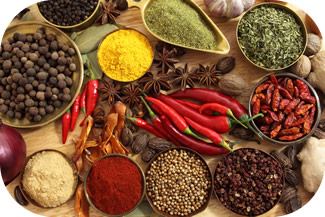Herbs and Spices
 There are also a variety of spices that can help prevent or reduce inflammation.
There are also a variety of spices that can help prevent or reduce inflammation.
- Garlic has been known for centuries to reduce inflammation and works similarly to NSAIDs because it blocks the pathways that lead to inflammation. Garlic has anti-bacterial, anti-viral, anti-fungal, and antioxidant properties. It is believed that “much of garlic's therapeutic properties come from its sulfur-containing compounds, such as allicin” and “research has revealed that as allicin digests in your body it produces sulfenic acid, a compound that reacts faster with dangerous free radicals than any other known compound.”
- One of these anti-inflammatory spices is Turmeric. This beneficial spice is a major ingredient in Indian cuisines and is also used to make yellow mustard in the states. Turmeric is known to be a disease-preventative agent and regarded highly in the medical community as an anti-inflammatory agent. It is also able to treat or prevent diseases like Alzheimer’s, arthritis and cancer. ”Turmeric has been recognized by scientists to hold incredible anti-inflammatory effects due to its active ingredient, curcumin, shielding the body against oxidative stress.” You can even make a turmeric tea and add honey or lemon for different flavoring.
- Then, there is Ginger. Ginger is not only recognized across the medical realm as a spice that can ease gastrointestinal stress, but it also contains very potent anti-inflammatory compounds known as gingerols. Ginger can be placed in a variety of meals to add spice or flavor, so there are multiple ways to use this ingredient while cooking. Ginger can also be made into a tea and can be used as an additive in any of your favorite teas. You can add ginger to lemonade and it also goes great with honey and cane juice. You can also add ginger to any rice dish for flavoring or combine ginger with olive oil and garlic to make a delicious salad dressing. Ginger has been known to successfully reduce inflammation in those who have arthritis, specifically arthritis of the knee. In one particular 12-month research period, 29 knee-arthritis patients participated in double-blind study where they were switched from a placebo to ginger after 3 months. By the end of the first 6 months, the patients who were given ginger experienced a significant drop in pain and a drop in swelling and inflammation in the knees. There are a lot of different types of herbs that not only promote health and healing, but also contain anti-inflammatory properties.
- Cumin and Chili pepper spice have been known for centuries to reduce pain and inflammation.
- Fresh herbs such as thyme, basil, and oregano are also full of antioxidants. Many types of herbs that reduce inflammation or pain can also be made into a tea. Basically, the idea is: if you can grind it up and put it in a tea bag or strainer, you can make a tea out of it. Try experimenting with your favorite herbs or do some research online for recipes that others enjoy.
- Capsicum is another anti-inflammatory agent that also provides a significant amount of different health benefits. Capsicum can be found in chili peppers, both in the fleshy membrane and in the higher concentration of the seeds. Capsicum is available in the form of a dried spice or paprika. This dried spice can be used in many sauces or added to beverages such as tea. Capsicum may also come in more concentrated forms and be used medicinally in oral capsules and is even applied topically to the skin as an analgesic. If you are using a topical treatment for inflammation, make sure you’re using one that contains capsicum.

